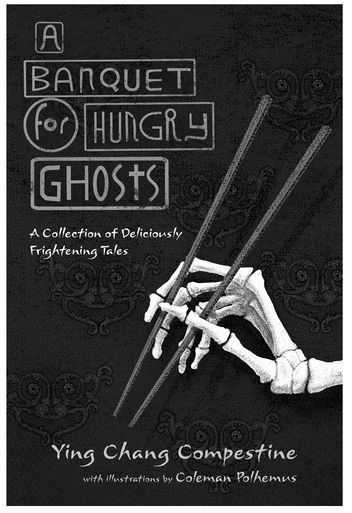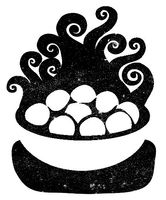Revolution Is Not a Dinner Party (15 page)
Read Revolution Is Not a Dinner Party Online
Authors: Ying Chang Compestine
Hungry ghosts have come back to haunt the living.
But can they be appeased with food?

Keep reading for an excerpt from
Â
A Banquet for Hungry Ghosts
available in hardcover from HENRY HOLT.

L
ONG AGO, IN 200 B.C.E, there was a small village called Bright Stars situated in the northern mountains of China, along the midsection of the Great Wall. The winter was harsh when this section of the wall was constructed. Heavy snowdrifts blocked the narrow paths through the rugged mountains. For months, supply caravans could not make it through to the workforce.
ONG AGO, IN 200 B.C.E, there was a small village called Bright Stars situated in the northern mountains of China, along the midsection of the Great Wall. The winter was harsh when this section of the wall was constructed. Heavy snowdrifts blocked the narrow paths through the rugged mountains. For months, supply caravans could not make it through to the workforce.
That winter, some of the workers mysteriously vanished. Everyone was puzzled as to where they had gone: There were no roads out, and with no food, the escapees would surely perish in the cold. Desperate to stop the disappearances, the camp master divided the workers into small teams and issued an order to punish the entire unit if one member deserted.
Despite food shortages, workers were forced to labor day and night in two shifts to meet the emperor's demandsâone mile of wall per day. Everyone struggled to survive.
However, one innâthe Double Happyânever seemed to run out of food. It served the best steamed dumplings anyone had ever tasted. No one knew how the owner, Mu, a portly and crafty middle-aged man, got the supplies to make his dumplings so delicious.
After the winter storms cut off the caravans, Mu raised his prices daily. Even so, hungry workers waited in long lines outside his inn. Everyone talked enviously about the fortune he was making.
One cold night after the inn had closed, two starving workers broke into the kitchen. They hoped to steal some food before heading to their evening shift. The taller one, with a rope tied around his bulky cotton jacket, tiptoed in behind his friend, whose ragged fur hat covered most of his face.
Full moonlight shone through the tall windows, leaving streaks of illumination on the kitchen floor. In the far corner, white mist hovered above a huge bamboo steamer on the stove. The scrumptious smell aroused their hunger and made them weak. As they reached for the dumplings, they heard scraping and chopping sounds from behind a cabinet next to the stove. They pushed the cabinet away from the wall, revealing a small door. Fur Hat opened it. Instantly, the pungent odors of garlic, ginger, pickled cabbage, meat, and blood repelled them back a step. Mu, the innkeeper, stood
silhouetted in the yellow light of an oil lamp. With a cleaver in each hand he hacked at a dark mound of red meat on a heavy rectangular table. Near him, in a pile on the floor, were arms and legs! Most of them had had the meat stripped from their white bones.
silhouetted in the yellow light of an oil lamp. With a cleaver in each hand he hacked at a dark mound of red meat on a heavy rectangular table. Near him, in a pile on the floor, were arms and legs! Most of them had had the meat stripped from their white bones.
When Mu noticed Fur Hat and Cotton Jacket, he waved his cleavers about wildly and ran toward them. Fur Hat was a trained kung-fu fighter. He pushed his friend aside and swept his left leg across the innkeeper's face, knocking him to the ground. The innkeeper's knives whipped narrowly past Fur Hat. The blood from them drew inky red lines on the wooden floor.
The two workers dragged Mu across the room. Cotton Jacket took the rope from his waist and tied the innkeeper's hands to the table's thick legs.
“You watch over him,” Fur Hat said as he ran toward the door. “I'll go report this.”
“No!” begged the innkeeper. “Please, I'll make you both wealthy. You will never go hungry again.”
Fur Hat stopped, glanced at the flesh on the cutting board, and spat at the innkeeper. “How dare you offer me this disgusting meat! I would rather die of hungerâ”
“No, no! Of course not! I have roasted chicken, smoked fish, and rice cakes for you.” He jerked his chin toward the dark corner. “There, in those jars.”
Cotton Jacket reached into one of the jars and took out a chicken wing. He bit into it. Thick brown sauce ran down his
large hand. The innkeeper's face lit up. “Well, how about untying me and we'll talk.”
large hand. The innkeeper's face lit up. “Well, how about untying me and we'll talk.”
Cotton Jacket stopped stuffing his pockets with preserved duck eggs. “How did you kill them?” He tried hard not to look at the bloody pile as he asked.
“Easy!” A grin emerged upon the innkeeper's face. “Like drunk chickens. Whenever I ran out of meat, I offered my last customers some strong sorghum wine. None of them ever refused, and they drank it like water. Once they passed out, I slit their throats. Most of them didn't even wake.”
“You devil!” Cotton Jacket ran over and kicked the innkeeper in his side. The innkeeper moaned sharply.
“We can't be late for our shift,” said Fur Hat, as he grabbed pieces of salted fish from a jar. “Let's decide what to do with him in the morning.”
Ignoring the innkeeper's pleas, they moved the cabinet back into place, locked the door, and headed out into the cold.
That night, a section of the wall collapsed, burying a team of workers alive. Fur Hat and Cotton Jacket were among them.
The next morning, people were puzzled as to why the Double Happy didn't open. Three days later, a group of hungry workers broke in. They ate everything they could find, including the rock-hard, frozen dumplings in the steamer.
Before long, they noticed many large rats with shiny eyes and wiry whiskers, scurrying out from behind the cabinet.
Each carried a strip of dark red meat. The workers moved the cabinet and found the door. Thinking they'd discovered a secret cache of food, they crowded into the room and then quickly fought to get out, shrieking and vomiting as they ran away.
Each carried a strip of dark red meat. The workers moved the cabinet and found the door. Thinking they'd discovered a secret cache of food, they crowded into the room and then quickly fought to get out, shrieking and vomiting as they ran away.
Inside, the innkeeper's trussed body slumped against the table. Scattered near him were the clothes, shoes, and bones of the missing workers.
Large gray rats ran up and down the innkeeper's body, tearing at the remaining tattered organs. Part of his left cheek was missingâand his face was frozen in a primal scream.
That was the last day anyone ever entered the inn, until many years later â¦
REVOLUTION IS NOT A DINNER PARTY. Copyright © 2007 by Ying Chang Compestine. Map copyright © 2007 by Jennifer Thermes. All rights reserved.
For information, address Square Fish, 175 Fifth Avenue, New York, NY 10010.
Square Fish and the Square Fish logo are trademarks of Macmillan and are used by Henry Holt and Company under license from Macmillan.
Â
Â

An Imprint of Macmillan
Â
Â
eISBN 9781429924559
First eBook Edition : April 2011
Â
Â
Library of Congress Cataloging-in-Publication Data
Compestine, Ying Chang.
Revolution is not a dinner party / Ying Chang Compestine.
p. cm.
Compestine, Ying Chang.
Revolution is not a dinner party / Ying Chang Compestine.
p. cm.
Summary: Starting in 1972 when she is nine years old, Ling, the daughter of two doctors, struggles to make sense of the communists' Cultural Revolution, which empties stores of food, homes of appliances deemed “bourgeois,” and people of laughter.
[1. ChinaâHistoryâCultural Revolution, 1966â1976âJuvenile fiction.
2. ChinaâHistoryâCultural Revolution, 1966â1976âFiction.
3. PersecutionâFiction. 4. Family lifeâChinaâFiction. 5. PhysiciansâFiction.
6. CommunismâFiction.] I. Title.
PZ7.C73615Rev 2007 [Fic]âdc22 2006035465
2. ChinaâHistoryâCultural Revolution, 1966â1976âFiction.
3. PersecutionâFiction. 4. Family lifeâChinaâFiction. 5. PhysiciansâFiction.
6. CommunismâFiction.] I. Title.
PZ7.C73615Rev 2007 [Fic]âdc22 2006035465
Originally published in the United States by Henry Holt and Company
Square Fish logo designed by Filomena Tuosto
Design by Meredith Pratt
First Square Fish Edition: 2009
Square Fish logo designed by Filomena Tuosto
Design by Meredith Pratt
First Square Fish Edition: 2009
Other books
For the Love of Temperance (The Adventures of Ichabod Temperance Book 3) by Ichabod Temperance
A Drink Before the War by Dennis Lehane
Beatles vs. Stones by John McMillian
Guy Renton by Alec Waugh
Innocent Graves by Peter Robinson
Manus Xingue by Jack Challis
Score! by Jilly Cooper
The Venusian Gambit by Michael J. Martinez
Highland Games by Hunsaker, Laura